The 10 Step Career Pivot - Part Three
The next right step...
In Parts One and Two of this essay series, I walked through steps one to six of my year to redefine a career. Indeed, this has been a time of transformation not just of my career, but of life.
This note I posted on Substack on Easter Monday sums up how far I’ve come:
Since then, I’ve been on a tour of in person, creative events across the country - in Northumberland, Oxfordshire and London. I have met kindred spirits, nurtured my writing, speaking and creative practice, and felt the joy of gathering. And I have felt the exhaustion that is the shadow side of the mental and physical exertion that comes with peeling off my introvert shell. So here, I rest, reflect, and absorb the experiences, so that I can share with you the what’s next of my career pivot journey.
To recap, then. Steps one to three explored the time of quiet preparation before a major transformation, then steps four to six delved into the heart of identity:
Step One - There is no rush
Step Two - Space to think
Step Three - Seek the right support
Step Four - Who am I?
Step Five - What makes me happy?
Step Six - What drives me?
In today’s final instalment, the focus is on shifting the momentum from a chaotic spin to intentional forward movement. It’s defining the next right step and then stepping through the doorway from the old into the new. And so the best place to start is to take one more look inside.
I learned recently that the key to a sustainable, purposeful, joyful career, is to spend as much time as possible operating in our Zone of Genius. This moment of enlightening came courtesy of the incredible Elaine Welteroth in her MasterClass ‘Designing Your Career’.
Understanding what drives us - what we are truly passionate about, is one of four elements that must intersect to define our Zone of Genius. If we are passionate about our work, our potential is limitless. For energy is born from purpose.
The Ten Step Career Pivot - Part Two
Step Seven: A career mission statement
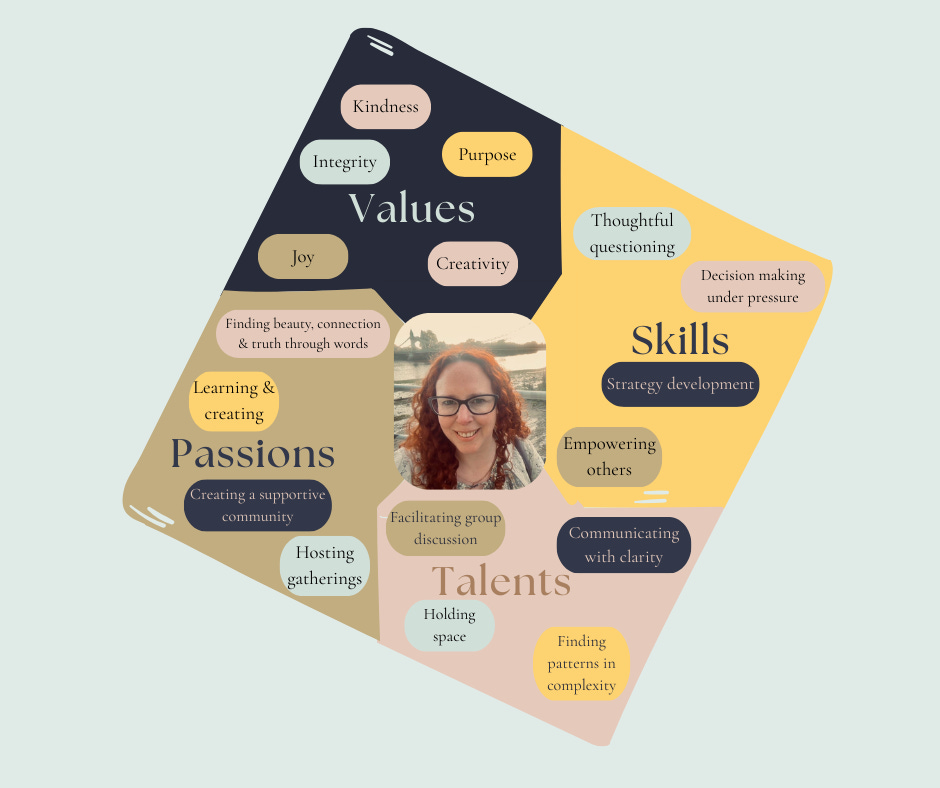
When I first attempted to articulate a mission statement - a defined declaration of my career goals, I gave up after an hour of looking at an empty page. Indeed, I wrote a whole essay around not knowing what my goals were.
But with time and space, through the processes of journalling and deep conversation, and exploration of the intersection of my core values, passions, skills and talents, I have arrived at a collection of words that seem to summarise what I hope to achieve in this next phase of life and career.
My personal mission is to create reflective, courageous spaces - through writing, gatherings, and strategic support - that help thoughtful people make clear and conscious decisions, build lives based on love and joy, and promote systems that prioritise people.
Now you might look at this, and think “But Lou, what does any of that actually mean?”, which is a fair question.
A mission statement, with our values as the foundation, and our skills, talents and passions as building blocks, can provide a framework on which to construct a career.
In my case, I know that I want to write, and I also want to bring people together. I want to make use of the experience and skills I’ve gained in my two decades in medicine. And I want to generate impact at system, or even population level, to improve lives - to put people first. So how will I do that? Well, thankfully, there are three more steps to help me work that out…
Step Eight: I don’t need another qualification
This… was quite the revelation to me.
Throughout my life, I have been gathering qualifications as if they are Pokemon. Never quite able to sit in contentment after achieving a certificate in something-or-other, I would have scoped out the next before even passing the first. Partly, this was driven by the culture of surgical training. There are countless courses and exams that seem to be constantly required to pass to the next stage or placement. But there is also an awareness that the ‘bare minimum’ - possession of only those awards which are mandatory for progress - does not an attractive CV make.
My current post nominals (used only once in recent memory, in response to a patronising email from a letting agent who’d signed off with a full title, grandiose job title, and his ‘BA’ after his name… the moment of satisfaction was worth the extra minute to tap out the letters) are BMBS, BMedSci(Hons), DCH, PGCert(MedEd), FRCS(Paed Surg).
Even since leaving medicine, I signed up for two courses in Python programming at the University of Helsinki, because studying something that sounded interesting kept me busy and there was an enjoyable dopamine rush when I got notification that I’d passed both the ‘Introductory’ and ‘Advanced’ programming courses with a top grade.
So when considering my next career steps, my instinct has been to look towards a new qualification. In fact, if I’m honest, I think the only thing that held me back from signing up to a £5k coaching course or a £2k programme in sound therapy was my lack of income and need to be more financially aware. But, and this is particularly relevant when a career pivot point comes after a significant period of experience, there’s an important question to ask:
Is another qualification necessary to meet my next career goal? Or would a further period of study, with the potential financial and opportunity cost involved, really be procrastination in search of validation? The answer is of course, individual.
As I spent more time deeply reflecting and exploring what I want to do with this next stage of life, and considering the skills and experience I already have, I realised that another piece of paper is not going to make a difference to my credibility nor ability to do the work I want to do. And if, as my new career develops, there is a particular training or qualification that will help in advancing towards my goals, then I can sign up at that point. Right now, as uncomfortable as it is to write this, I have all I need, and I am enough. So now I have no excuse, but to get on with it…
Step Nine - What can I ask from my career?
It’s all very well to write about the zone of genius, my love of creativity, and the change I want to make in the world, but I need to be realistic. I’m not building a hobby, here. I am crafting my expertise into an offering with an intention that it brings value to the world, and that my family is supported by my work. Of course, this means that thorniest of topics - money. If thinking about not doing another qualification was uncomfortable, well - then this is a bed of nails.
There is a creative contract at play. In exchange for the time, attention, value we provide, we should be able to expect ask for fair reward - whatever that means to us.
In the NHS, there is a pervasive culture of scarcity. Not enough staff, not enough time, not enough money. Salaries have been eroded by year after year of pay freeze or sub-inflationary pay rises, and there has long been an expectation to come in early and stay late without question, because it’s for the good of the patients. Only very recently have NHS staff taken decisive industrial action in a campaign to improve pay and conditions, and though a controversial deal was reached, there is already further disquiet around this year’s pay proposals. Still, most health care staff would agree, that this is not a career that anyone goes into for the money, and we know that successive governments rely on goodwill to keep the health service functioning. So, designing a career based on those parts of life that bring me joy, and that I am good at, leads me to wonder whether that ought to be enough. That to want to be paid also for the work I do is somehow… greedy?
Of course, I know that it is not unreasonable to recognise that our work has value. And as money happens to be the construct that society has designed as a means of quantifying and exchanging value, I need to get used to considering the financial aspects of a self-employed career.
I am all too aware that money brings up complex feelings for many. That the price of a product or service can indeed define its value. And that things that are free are often perceived as worth less than things that are paid for - take the example of a patient I once saw on a home visit who asked me to come another day as she was on her way out to the hairdresser… There is also the fact that society tends to value those skills and trades traditionally seen as ‘men’s jobs’ over those more traditionally offered by women - while a seamstress, childcare worker and cake decorator might earn up to £20k a year, a plumber, carpet fitter and bodyshop technician would expect to earn closer to £30k1. Creative careers have the additional overlay of the starving artist archetype - based around an expectation that the pleasure of doing what you love should be reward enough. Long gone though, are the Romantic era days when a tortured soul was almost considered a precursor to meaningful art. The economic and creative contribution of writers and artists in modern society is undeniable, so of course they/we should be paid for their/our work.
In terms of my own expectations of career reward, financial and otherwise, I have concluded that I want to earn enough that I can spend freely on things that matter for my family, host generously, and create positive change in my community. In reality, that probably means aiming towards an income that matches my previous medical salary, though I expect this will take time to build. More than money though, I ask of my career that I have a greater autonomy over my working day, a freedom of work location, and the flexibility to adapt as necessary, so that family, joy, and life are no longer sacrificed on the altar of work. Lofty goals, perhaps. But I feel a clarity that has long eluded me when wading through the mudded years of surgical training. The future feels full of potential. I am excited about what is to come.
So there is one final step to take in this career pivot year.
Step Ten: Letting go
Taking the next right step requires an untethering from the past. We must learn to let go of what was so that we may be open to what will be.
It is time to let go of who I was, and step into the present moment, facing the future with open eyes and an open heart.
Letting go does not mean overwriting the past. I can take the many lessons I’ve learned in my two decades in medicine. Indeed, they have been instrumental in bringing me to where I am today. I can be proud of all that I achieved. I can hold memories of the people I met, the lives I touched and was changed by. I can carry them all with me as I build my new career on the foundations of the old. But today, I let go of the identity I had moulded into. I was a surgeon. I am a writer.
And so, what next…?
I have several projects in development that I hope to bring to you very soon, but for now I have two pieces of news to report.
Firstly, I’m very proud to share that I was recently appointed as a Non-Executive Director of Lemon Jelly Press CIC. Lemon Jelly Press is an independent publisher with a mission to amplify unheard voices, bringing humanity to the page. Founded by Lottie Begg in the Isle of Wight, the small team are currently reviewing submissions for the first collection of published novellas, picture books and poetry. This is an incredibly exciting time, and I am honoured to be part of the strategy team supporting Lottie to widen access to publishing and champion social equity in the stories we and our children read.
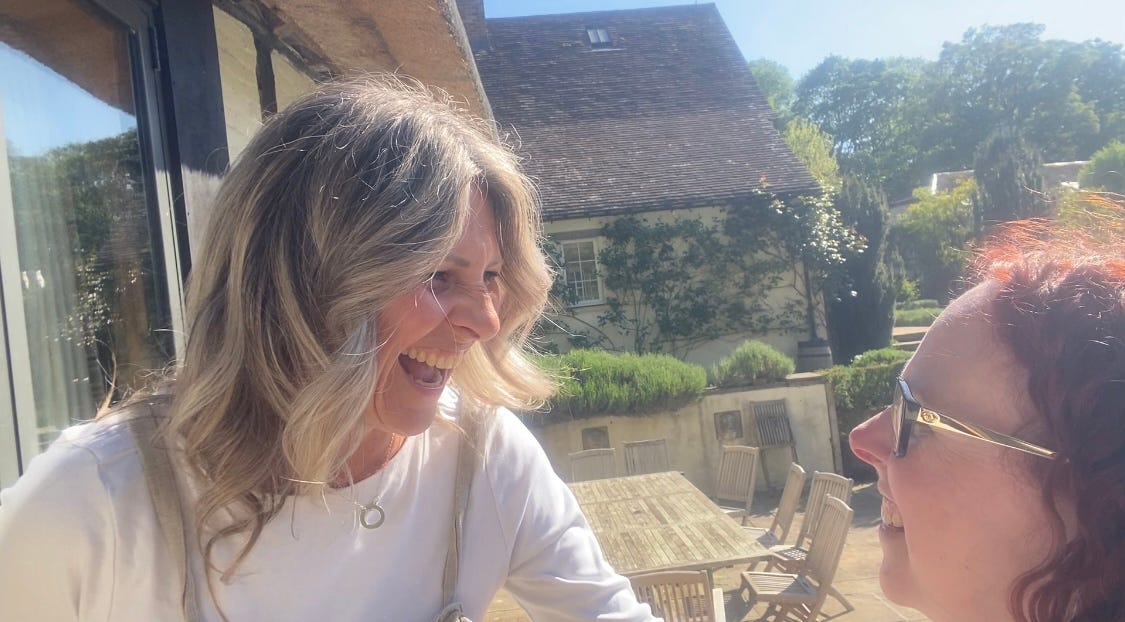
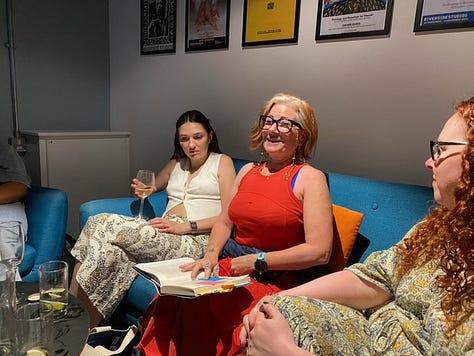
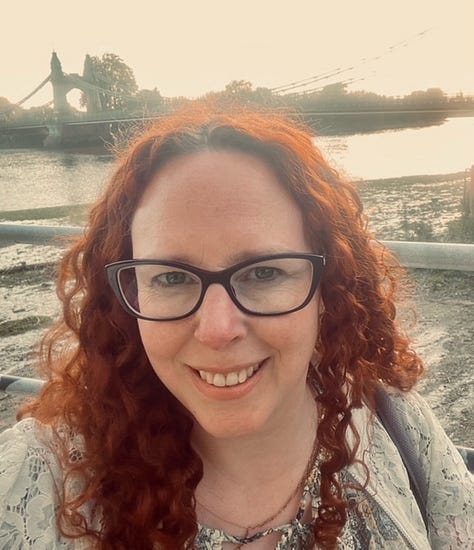
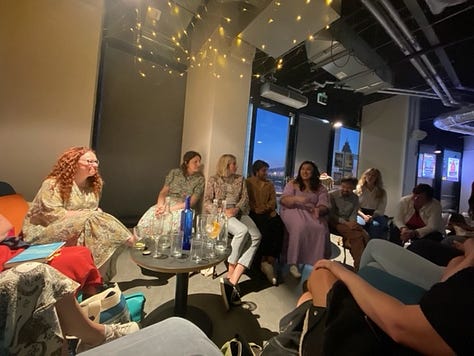
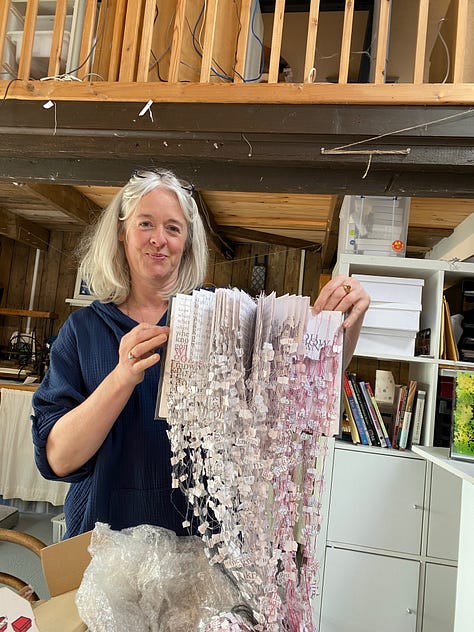
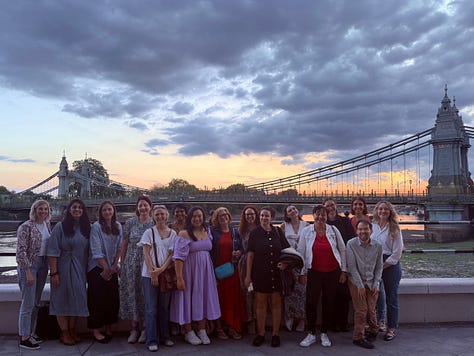
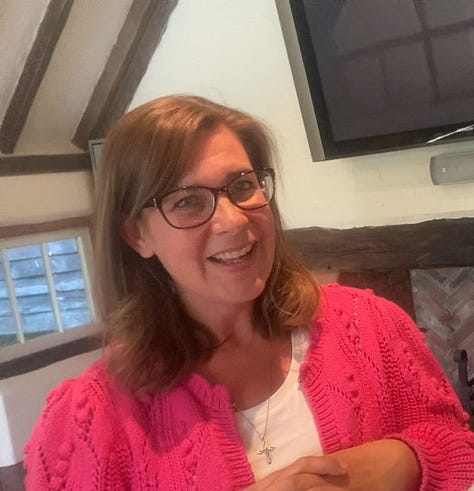
And second, you may have seen brief mentions of my second publication, LiveStack in previous newsletters. LiveStack is the home of in person gatherings for writers and creatives. In the last two weeks I’ve been on a tour of LiveStack events, taking part in a bookbinding workshop in Northumberland, a glorious day retreat in Oxfordshire and even performing at an open mic night in West London. You can find write ups (and video evidence) over on the LiveStack Tour page, and if you’d like to keep up to date with what’s on, you can sign up to the newsletter here.
Please do let me know what you thought of the ten step career pivot series, or any thoughts that this piece brought up for you. It makes the writing all the more meaningful when it starts a conversation, and I’m so grateful that you’re here.
Thanks so much for reading/listening.
Pay estimates obtained from UK average wages website



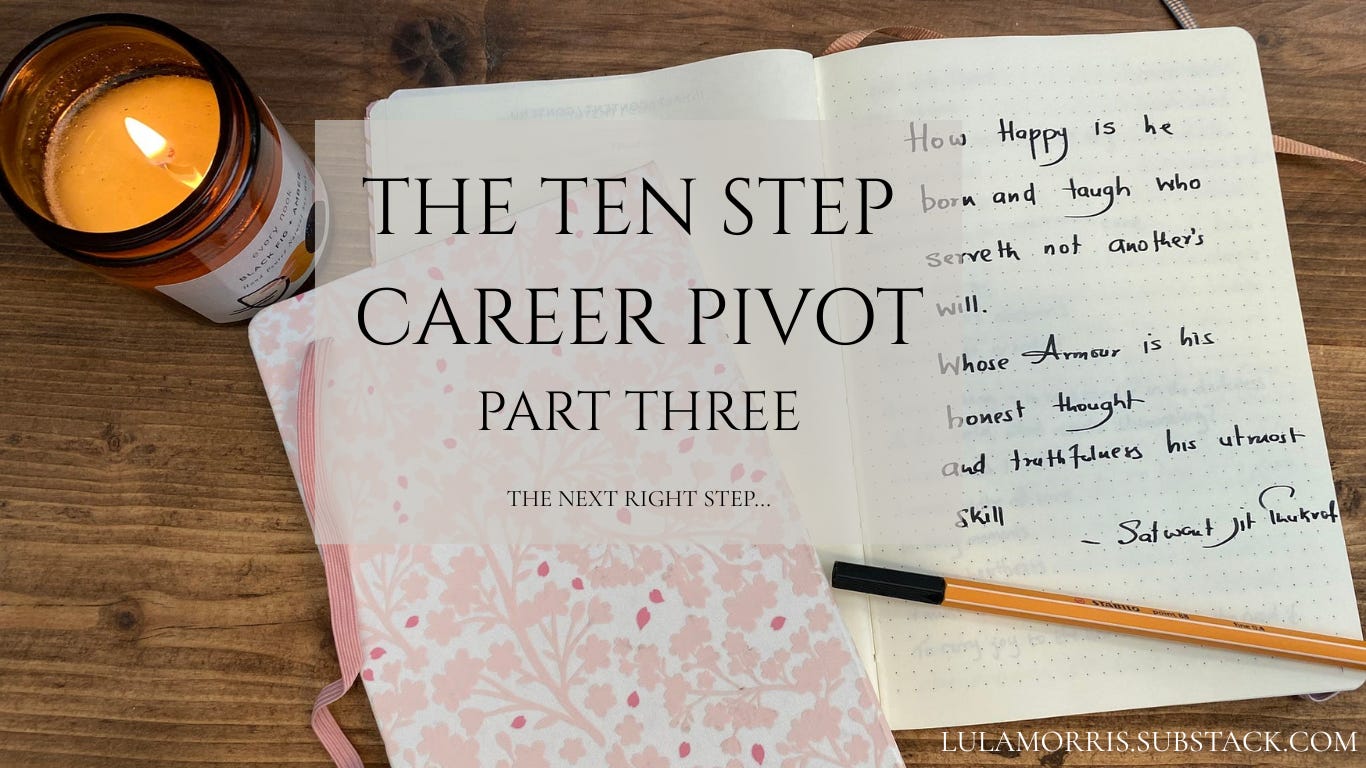
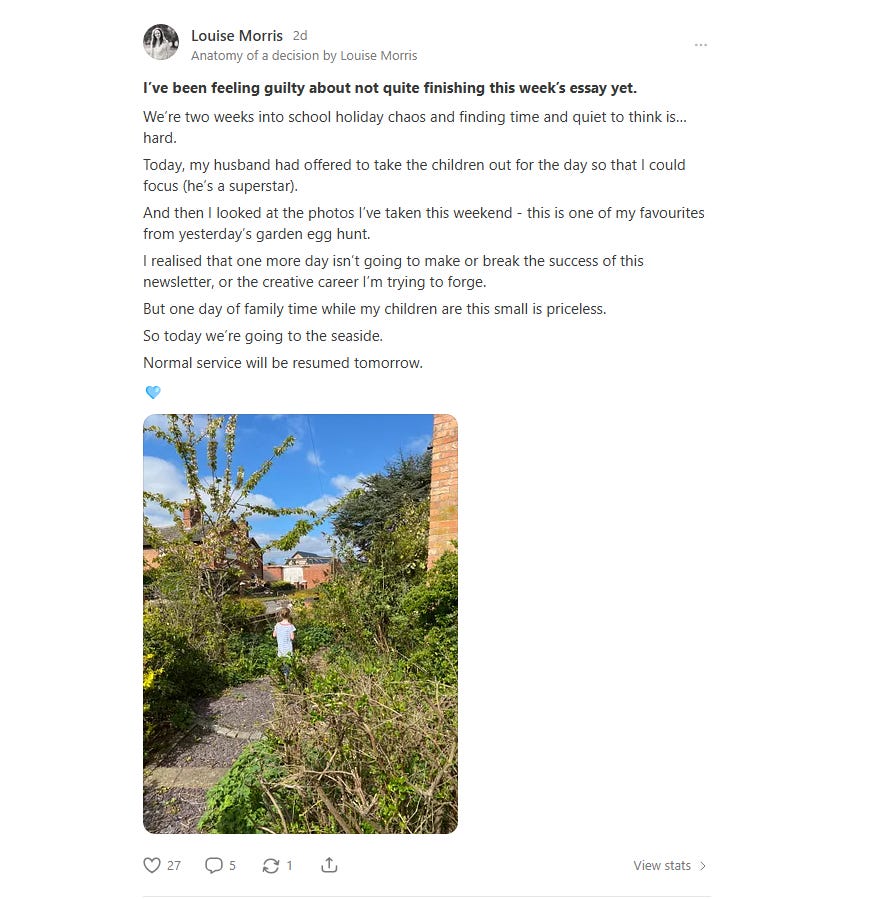
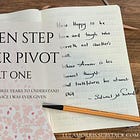
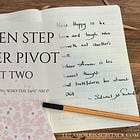

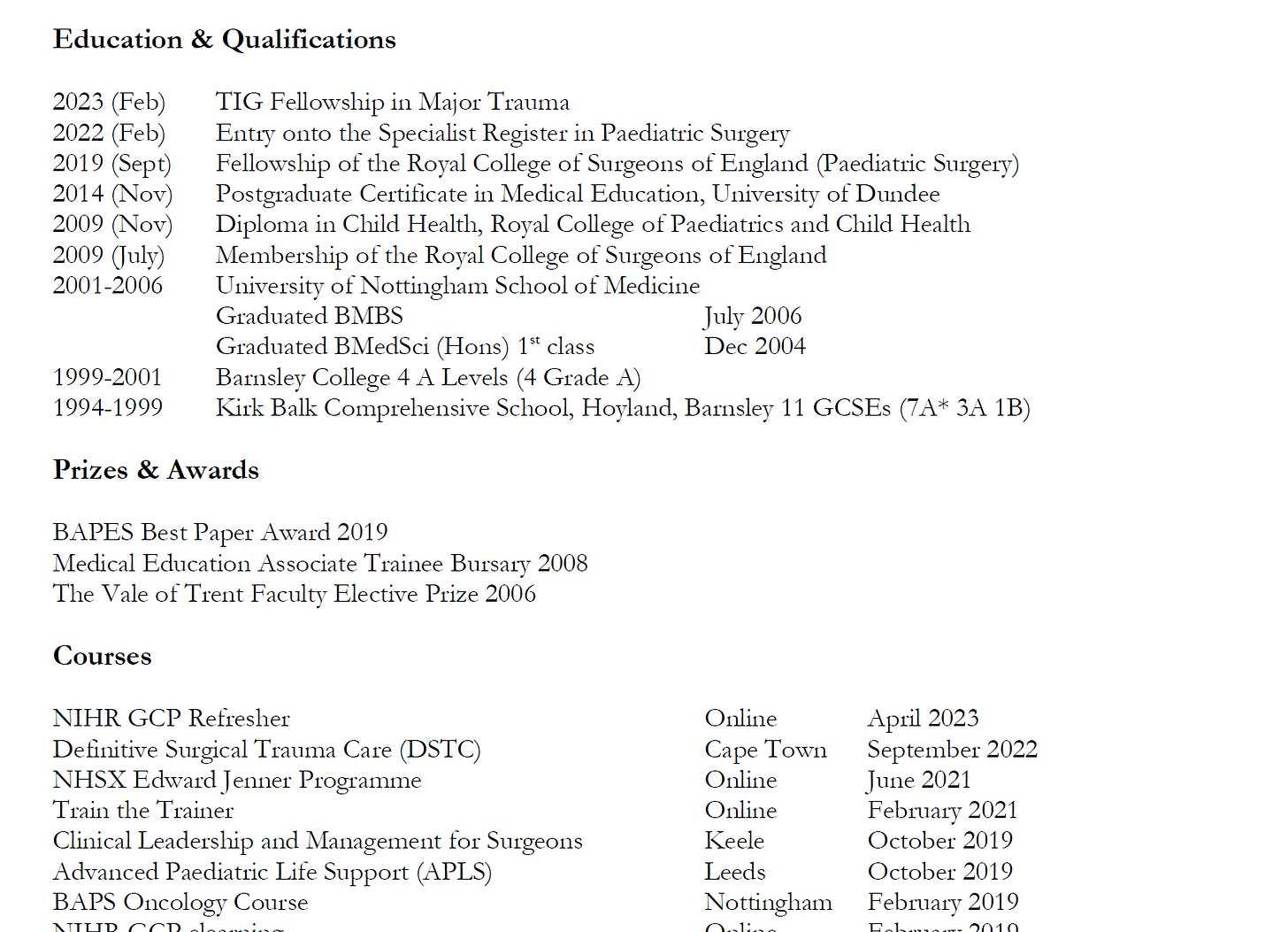

I have really enjoyed this pivot series Louise - thank you for sharing so generously! It's been both encouraging and inspiring to read /listen to how you're thinking through it all, and giving me lots of ideas!
I think it's also felt like one big permission slip - for you and for readers.
Excited to see where this path takes you next! X
Gorgeous to read of your creative adventures Louise, I wish you many more . We don’t need more qualifications or to read another book, just find your zone of genius..great advice.